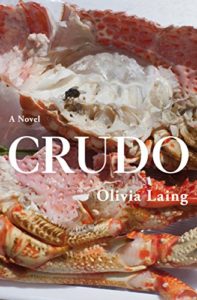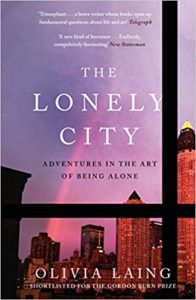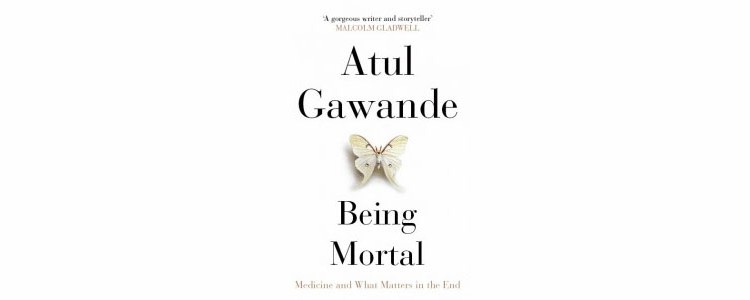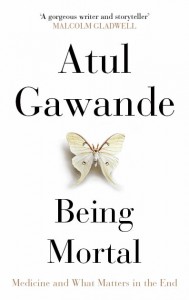“Crudo: A Novel” by Olivia Lang
 Kim Jong-un had called Trump a dotard, perhaps they’d all be blown to smithereens. Still, ants at least would proceed, building up their infinite cities, stealing honey from the cupboards. She held on to her bag. She waited for her flight. She loved him, she loved him. Love is the world, pain is the world. She was in it now, she was boarding, there was nowhere to hide.
Kim Jong-un had called Trump a dotard, perhaps they’d all be blown to smithereens. Still, ants at least would proceed, building up their infinite cities, stealing honey from the cupboards. She held on to her bag. She waited for her flight. She loved him, she loved him. Love is the world, pain is the world. She was in it now, she was boarding, there was nowhere to hide.
Olivia Lang’s debut novel Crudo is about Kathy, a writer, and her impending marriage — the bare storyline. While reflecting on her personal life undergoing a massive transformation. She, who is in her early forties, successful writer and teacher who is at ease in Britain and USA, soon-to-be-married, third wife of her future husband, ponders over what it would be like to share spaces with a husband. While reflecting upon the changes in her life she inevitably begins to look at the socio-political landscape. She cogitates about Brexit. She wonders about the consequences of electing Trump as President of USA and few months into his presidency has been a series of catastrophes. She often remarks upon the acrimonious relationship between the presidents of USA and North Korea. She escapes to social media (” stalking the internet”) often but its a noisy universe.
People weren’t sane anymore, which didn’t mean they were wrong. Some sort of cord between action and consequence had been severed. Things still happened, but not in any sensible order, it was hard to talk about truth because some bits were hidden, the result or maybe the cause, and anyway the space between them was full of misleading data, nonsense and lies. It was very dizzying, you wasted a lot of time figuring it out. Had decisions really once led plainly to things happening, in a way you could report on? She remembered it but distantly. A lot had changed this year. The people who opposed it were often annoying but that didn’t make them wrong.
Olivia Lang captures exquisitely the loneliness of a person in a rapidly evolving world which engulfs an individual  24×7 in a cacophony of images, words and experiences particularly if they are hooked to social media. Olivia Lang’s character Kathy seems to be an amalgamation of all the lonely individuals Lang describes in her non-fiction bestseller The Lonely City: Adventures in the Art of Being Alone. It is as if Lang wishes to explore further how an individual who seems to be successful in all senses of the word — professionally, socially and economically — how do they actually exist? The Lonely City is a collection of essays reflecting upon the decadence of humans on technology particularly noticeable in cities. And yet, ironically, while there is this veneer of being super connected, socially active and part of a thriving community there are many who are terribly lonely in the city. In some cases this solitude is by choice. Olivia Lang is curious and understanding about this individuals while being inquisitive too and this inquisitiveness she hopes will be fulfilled to some degree by her character Kathy in Crudo who is an epitome of all the lonely souls of The Lonely City. The political commentary that is as fascinating to her as the changes in her personal space makes her a sharp and perceptive observer, a trait many quietly reserved souls exhibit. Towards the conclusion it is hard to discern the difference between Kathy the character and Olivia Lang the writer, they seem to become one:
24×7 in a cacophony of images, words and experiences particularly if they are hooked to social media. Olivia Lang’s character Kathy seems to be an amalgamation of all the lonely individuals Lang describes in her non-fiction bestseller The Lonely City: Adventures in the Art of Being Alone. It is as if Lang wishes to explore further how an individual who seems to be successful in all senses of the word — professionally, socially and economically — how do they actually exist? The Lonely City is a collection of essays reflecting upon the decadence of humans on technology particularly noticeable in cities. And yet, ironically, while there is this veneer of being super connected, socially active and part of a thriving community there are many who are terribly lonely in the city. In some cases this solitude is by choice. Olivia Lang is curious and understanding about this individuals while being inquisitive too and this inquisitiveness she hopes will be fulfilled to some degree by her character Kathy in Crudo who is an epitome of all the lonely souls of The Lonely City. The political commentary that is as fascinating to her as the changes in her personal space makes her a sharp and perceptive observer, a trait many quietly reserved souls exhibit. Towards the conclusion it is hard to discern the difference between Kathy the character and Olivia Lang the writer, they seem to become one:
Writing, she can be anyone. On the page that I dissolves, becomes amorphous, proliferates wildly.
Concealed behind the thin guise of fiction, it is perhaps “easier” to express fear about the increasing political instability in global politics, its ramifications on the individual, and yet “she was in it now, …, there was nowhere to hide.” Take for instance the conversation about Kim Jong-Un and Trump, Kathy/Olivia are fearful of what the stubborness of the two leaders may result in and yet who was to know that weeks before the publication of Crudo* ( 28 June 2018) the two leaders would actually meet in a historic summit held in Singapore on 12 June 2018.
Truth is stranger than fiction and fiction lives off reality. Politics and literature have always been and always will be inextricably linked. Crudo is a stunning testament to the fact.
Olivia Lang Crudo Picador, Macmillan, London, 2018. Hb. pp. 156
12 June 2018
*I read an advance review copy ( ARC). While this blog post was composed and written on 12 June 2018 as mentioned it was not made public till after the release date of the book of 28 June 2018.
** All images are off the internet. I do not own the copyright. If you do please let me know and I will update the blog with the correct information.





